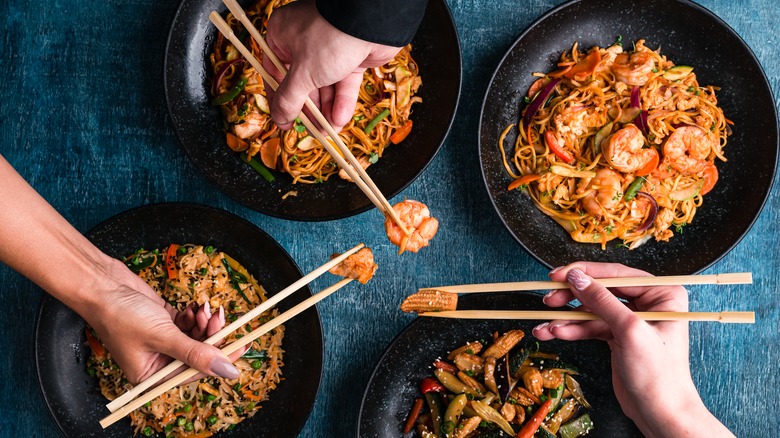20 Pro Facts To China Famous Food Destinations
20 Pro Facts To China Famous Food Destinations
Blog Article
Top 10 Tips To Deal With copyright Products When Shopping In China
1. Designer bags, watches electronic gadgets and designer clothing are among the most frequently counterfeited items. When shopping for these items be cautious.Pro: Helps you focus your focus on possible copyright products.Cons: It's possible to doubt genuine products if you don't have the proper knowledge.
2. Find out the authenticity of the productIt is important to familiarize yourself prior to shopping with the brand's name it's logo, the information about materials and packaging.Improves your ability to detect subtle differences between genuine and fake products.Con: It can take some time, especially when making use of products you don't know.
3. Trusted StoresTip: Stick to official brands stores or reputable malls, like Beijing's China World Mall (or Shanghai's Plaza 66) for high-value goods.Pro It comes with receipts and warranties and ensures the authenticity of products.Con: Products may be priced higher at the market or in smaller shops.
4. Labels and tags need to be inspectedPay attention to misspellings, inconsistent typefaces or inferior materials on packaging and labels.Pro: A fast and easy way to detect poorly made counterfeits.Pros: copyright can be high-quality and closely resemble originals which makes them difficult to detect.
5. Be wary of "too good to be authentic" price tagsThe cost of luxury items is usually very affordable. This should cause a red alert. Luxury items are rarely sold at a price that is significantly lower than retail.Pro: Beware of obvious scams.Con: Some sellers are charging moderate prices to make counterfeits look more authentic.
6. Demand Certificates for AuthenticityTips: When purchasing items such as jade, antiques, brand-named items, ask for documentation to prove authenticity.Pros: It gives you an extra layer of confidence.Con: Because certificates may also be faked, this method isn't 100% foolproof.
7. Test Before You PurchaseAsk to test electronics and high-value products before you purchase these items.Pro: Aids in confirming functionality and high quality.Cons: The seller might not allow for testing or the tests may only be superficial.
8. Do not buy antiques without expert knowledgeTIP: To make sure that an antique is authentic the item must have been confirmed by a specialist or require extensive study. If you're unsure of their authenticity, stay clear of them.Pro: Reduces the risk of being scammed with copyright or fake.Con: You might miss out on decorative objects that look appealing but not authentic.
9. Make use of a Local Guide You Can TrustA guide from your local area or a friend who is familiar with the market will be able to help you identify genuine vendors and spot counterfeits.Benefits: You'll save time and lower the chance of being a victim by shopping in untested markets.Con: Guides could expect a tip or commission that can add to your expenses.
10. Don't be afraid to trust your instinctsTip: If you feel that something is off--be it the vendor's attitude, the product's quality, or the price, walk away.Pro: It safeguards you against regrettable purchases.Be cautious: Being too cautious can cause you to miss some legitimate bargains.
Pros of Avoiding copyright GoodsDurability: Genuine products last longer and provide the best value in exchange for the money.Have Peace of Mind Don't worry about getting scammed.Legal Safety: Certain nations penalize travelers if they bring returned copyright goods.Reputation of the Brand: Buying genuine products can help maintain ethical business procedures.The cons of staying away from copyright productsGenuine products can be more expensive.Limited availability Limitation of Availability: Original products may not always be sold on the streets or in smaller stores.You may have missed some excellent deals. Certain counterfeits are of excellent quality and provide a great value for the price.These suggestions will allow you to navigate shopping in China confidently and make an informed choice about whether or not you are looking to buy authentic products. Have a look at the best explore the riChness of Chinese food for site recommendations including China flavorful food culture, discover hidden food gems in China, delicious Chinese dishes to try, journey through China food culture, culinary experiences across China, culinary experiences across China, discover the tastes of China cities, culinary experiences across China, the best food destinations in China, from street food to fine dining in China and more.
Top 10 Tips For Cultural Respect When Visiting Famous Temples In China
1. Follow Temple EtiquetteTip: Each temple has their own guidelines and customs. Be aware of local customs and follow them, whether they are making a bow or offering incense during the ceremony.
Pro: Shows respect for the temple's religious practices and rituals.Cons: It could be a bit overwhelming for those who are not familiar with the rules of temples and etiquette.2. Dress modestlyDress in conservative clothing that covers your arms, shoulders, and legs. Certain temples might provide shawls or scarves for visitors who require a protect themselves.
Pro: Avoids offending people in the community by being respectful and avoiding offensive words.Con: It can be uncomfortable in hot weather, which is why you need additional clothing and preparation.3. Be calm and remain silent.Tips. Keep a calm serene and calm manner. Particularly in prayer areas and sacred places. Speak gently and avoid loud discussions.
Pro: It protects the sanctity the space, and honors worshippers.Con: Silence can be uncomfortable or unnatural in crowds of tourists.4. Avoid Disrupting WorshippersTips: Avoid disturbing people who are praying, meditating or engaging in other rituals. Give them space and time to complete their meditations.
Pro: Shows consideration for others' spiritual practices.Con: Although you might be tempted by the prospect of talking to the congregation, it's crucial to keep your eyes on the ball.5. Don't touch sacred objects.Tips: Don't touch statues, altars, or other items of the sacred unless they are specifically permitted. These objects are considered to be highly sacred.
Pro: Respects cultural practices and safeguards the holy.Cons: You may be tempted by the items in order to photograph them or simply out of curiosity.6. Be respectful of eldersTips: In many temples, elders are honored. It is important to be courteous and respectful when you interact with.
Pro: Honors respect for elders as a societal value.Con: It could feel unfamiliar if you come from a culture that values respect and isn't determined by age.7. Take the lead from localsTip: Pay attention to the way people behave in local communities to learn the proper way to behave like how they offer their services and the best places to walk.
Pro: You'll fit in easily and make sure that you're following proper procedures and without making any mistakes.Cons: It might require some time to watch the practices and understand them.8. You should seek permission before taking photos.Ask permission to take photos before you do, especially at places where people are praying. Some temples may prohibit photography entirely.
Pro: Represents respect for privacy and the sacredness of space.Con: You might miss out on some great photography opportunities in gorgeous areas.9. Honest and Respectful OffersDon't go overboard when offering a gift. Do not give extravagant gifts unless when you need them.
Pro: Aligns local customs.Con: You may feel uneasy about what you should offer without guidance from a local source.10. Be mindful of your language and BehaviorMaintain a calm and respectful manner at all times. Beware of inappropriate language or jokes in sacred areas.
Pro: It helps create an environment that is peaceful and respectful among all visitors and worshippers.Con: Typically, humor or a relaxed style of communication is the best approach, but you must remain calm.Chinese temples: a site that is a symbol of respect for culturePositive Relationships with Locals: If you show respect to cultures it is possible to build positive relationships with the people whom you meet.Deepened Cultural Understanding: Demonstrates the desire to know more about and be immersed in Chinese culture.The interaction with the temple's culture creates a memorable and enriching experience.Avoiding mistakes By adhering to cultural norms, you will be careful not to disrespect sacred sites or people. You will be able to enjoy an enjoyable visit.Higher Spiritual Sensitivity : Respecting other people can help you comprehend the spiritual practices of people in the vicinity, creating an increased sense of belonging.The negatives of respect for culture in Chinese templesCultural Misunderstandings: You could be confused about the rules of the temple or even make a mistake if don't have prior knowledge.Dressing modestly, or adhering to the rules of dress in hot temperatures could cause discomfort.Limitations of Freedom: If you stick to strict rules you may feel that you are restricted in the way you experience the temple.Time-consuming: Studying temple customs and observing rituals can take more time. This can affect your overall itinerary.Language Barriers - It may be hard to ask permission or understand certain rituals when a language barrier is present.By embracing these tips and showing cultural respect and respect for the culture, you'll not only get a an enriching and rewarding experience visiting China's temples, you'll also contribute to preserving the sanctity and traditions of these sacred places. Take a look at the top explore China riCh food history for website recommendations including the flavors of Chinese cuisine, taste the regional flavors of China, a culinary journey through China, top Chinese food experiences, culinary tours of China best cities, China famous food destinations, discover hidden food gems in China, uncover China food traditions, savor China regional food specialties, a tour of China regional cuisine and more.